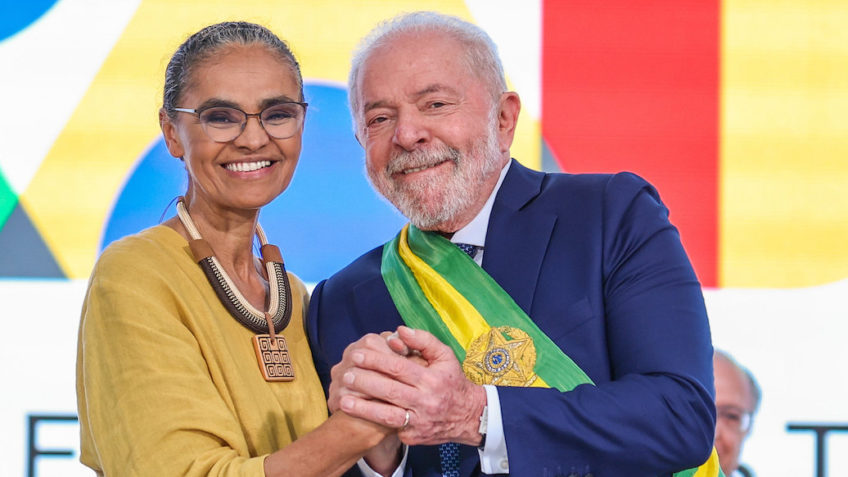By Mateus Maia
The third government of President Luiz Inácio Lula da Silva (PT) has adopted the environmental agenda as one of its priorities since the beginning.
For this reason, it mentions the Amazon in almost all international speeches, asking for help from rich countries to preserve the forest.
It has appointed Marina Silva to head the Ministry of the Environment.

With little more than five months in office, however, the Planalto saw the Congress dehydrate the minister’s power and is yet to announce tax incentives for the automobile industry in the coming days.
Of the four biggest defeats of the Executive in the House this year, three were related to the environmental agenda.
On May 24, the parliamentarians approved the MP (provisional measure) on environmental regularization (MP 1.150 of 2022), issued by the government of former president Jair Bolsonaro (PL).
The proposal approved by the House of Representatives loosens the rules on environmental licensing.
Last week, the PT administration suffered two defeats in a row.
On Tuesday (May 30), the House of Representatives approved the temporal milestone.
The proposal limits the demarcation of indigenous lands, determining that only lands occupied by indigenous people on October 5, 1988, the date of the promulgation of the Constitution, can be demarcated.
Although it is not a proposal by Lula, the approval is considered a defeat because Lula advocates pro-indigenous demarcations.
In March, he spoke of accelerating demarcations that were “ready” before people “seized” them.
The Temporal Milestone Bill, however, reduces the number of territories that can be considered indigenous.
The proposal will not move quickly through the Senate, however.
On Wednesday (May 31), the ministries of the Environment and Indigenous Peoples were emptied of their positions in approving provisional measure 1.154 of 2023, which restructured the Esplanade, increasing the number of ministries in the government from 23 to 37.
With the changes in Bulhões’ report, Minister Marina Silva lost strategic areas in the government.
The text removed the ANA (National Agency for Water and Basic Sanitation) from the Environment, which was transferred to the MIDR (Ministry of Integration and Regional Development), headed by Waldez Góes.
The minister is affiliated with PDT but was appointed through the influence of União Brasil.
Another change that emptied Marina’s ministry was the competence to deal with the national water resources policy, which was also transferred to Regional Development.
The management of the CAR (Rural Environmental Registry) left the MMA (Ministry of Environment) and the MDA (Ministry of Agrarian Development) and was transferred to the MGISP (Ministry of Management and Innovation in Public Services), headed by Esther Dweck.
SPEECH VS. PRACTICE
At the same time that Lula repeats to international leaders that Brazil and other countries that still have standing forests need to be financially rewarded for protecting them and that climate change should be a global priority, the President of Brazil’s Workers Party (PT) has been on a collision course with the environmental agenda.
In an arm wrestling match between Petrobras and Ibama (Brazilian Institute for the Environment and Renewable Natural Resources), Lula said he found it “difficult” that oil exploration near the mouth of the Amazon River would cause environmental problems in the region.
Ibama vetoed on May 17 a request by Petrobras to conduct test drilling off the coast of Amapá. Since then, the government has upheld the agency’s decision, supporting Marina Silva.
The decision was criticized by prominent politicians from Amapá, such as the president of the CCJ (Constitution and Justice Commission) of the Senate, Davi Alcolumbre (União-AP), and the leader of the government in Congress, Randolfe Rodrigues (no party-AP).
Senator Randolfe Rodrigues left Rede, the party founded by Marina, on Thursday (May 18), one day after the veto to oil exploration on the equatorial margin.
On another front, trying to win the middle-class electorate, Lula gave his backing to the stimulus package for the production of popular cars.
According to the Minister of Finance, Fernando Haddad, the final impact of the tax waiver will be less than the R$2 billion initially announced and will be fully compensated.
Besides being criticized for the increase in expenses in times of fiscal rigidity, giving tax incentives to an industry that produces vehicles that run on fossil fuels has also not gone unnoticed.
According to Poder360, the government itself considered the measure incoherent.
Besides the announcement having taken the economic team by surprise last week, behind the scenes, ministers say that the measure goes against what the world has been doing to achieve a more environmentally sustainable economy.
With information from Poder360
News Brazil, English news Brazil, Brazilian politics

